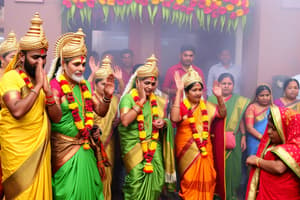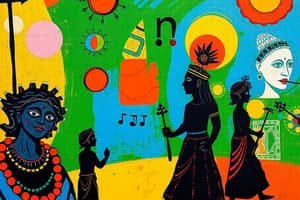Podcast
Questions and Answers
What are some examples of Indian classical dance forms mentioned in the text?
What are some examples of Indian classical dance forms mentioned in the text?
- Breakdance and Hip-hop
- Bharatanatyam and Kathak (correct)
- Tap dance and Flamenco
- Bollywood dance and Salsa
Which festival in India is known as the Festival of Lights?
Which festival in India is known as the Festival of Lights?
- Navratri
- Holi
- Pongal
- Diwali (correct)
What is one of the popular regional specialties of Indian cuisine mentioned in the text?
What is one of the popular regional specialties of Indian cuisine mentioned in the text?
- Pizza
- Pasta
- Biryani (correct)
- Sushi
Which epic is highlighted as one of the well-known works in Indian literature?
Which epic is highlighted as one of the well-known works in Indian literature?
Why is understanding Indian culture and heritage deemed essential according to the text?
Why is understanding Indian culture and heritage deemed essential according to the text?
What role do festivals play in Indian culture according to the text?
What role do festivals play in Indian culture according to the text?
What is a key characteristic of Indian culture according to the text?
What is a key characteristic of Indian culture according to the text?
Which major religions have influenced Indian culture according to the text?
Which major religions have influenced Indian culture according to the text?
What is one of the key elements of Indian cultural heritage mentioned in the text?
What is one of the key elements of Indian cultural heritage mentioned in the text?
Which Indian architectural wonder is mentioned in the text as showcasing grandeur and intricacy?
Which Indian architectural wonder is mentioned in the text as showcasing grandeur and intricacy?
What is one of the rich and diverse forms of art mentioned in the text as part of Indian cultural heritage?
What is one of the rich and diverse forms of art mentioned in the text as part of Indian cultural heritage?
Why is understanding Indian culture and heritage considered important according to the text?
Why is understanding Indian culture and heritage considered important according to the text?
Flashcards
Indian Culture
Indian Culture
A complex blend of traditions, beliefs, and practices spanning centuries.
Religious Pluralism
Religious Pluralism
Many religions existing peacefully together.
Indian Architecture
Indian Architecture
Famous for its grandeur and detail, like the Taj Mahal.
Indian Art Styles
Indian Art Styles
Signup and view all the flashcards
Indian Literature
Indian Literature
Signup and view all the flashcards
Indian Festivals
Indian Festivals
Signup and view all the flashcards
Indian Music
Indian Music
Signup and view all the flashcards
Indian Dance
Indian Dance
Signup and view all the flashcards
Indian Cuisine
Indian Cuisine
Signup and view all the flashcards
Indian Heritage
Indian Heritage
Signup and view all the flashcards
Cultural Legacy
Cultural Legacy
Signup and view all the flashcards
Religious Influence
Religious Influence
Signup and view all the flashcards
Study Notes
Indian culture and heritage are inherently rich and diverse, reflecting the country's history, values, and traditions. Understanding Indian culture and heritage is essential for appreciating the country's unique identity and preserving its cultural legacy. Here, we will delve into various aspects of Indian culture and heritage, exploring its history, customs, art, and philosophy.
Indian Culture: An Overview
Indian culture is a vast tapestry of diverse traditions, beliefs, and practices that have evolved over centuries. It is characterized by its religious pluralism, with major religions such as Hinduism, Buddhism, Jainism, Sikhism, and Islam coexisting harmoniously. These religions have influenced Indian culture in various ways, shaping its art, literature, music, and social practices.
Heritage of Indian Culture
The heritage of Indian culture encompasses a wide range of aspects, from its ancient civilizations to its contemporary art and literature. Some of the key elements of Indian cultural heritage include:
- Architecture: Indian architecture is renowned for its grandeur and intricacy, with examples such as the Taj Mahal, the Amber Fort, and the Hampi ruins showcasing the country's architectural prowess.
- Art: Indian art is rich and diverse, with various styles and forms such as Madhubani painting, Warli art, and miniature painting. These art forms have been passed down through generations, preserving the country's cultural heritage.
- Literature: Indian literature is a treasure trove of stories, poems, and epics, with works such as the Mahabharata, the Ramayana, and the Bhagavad Gita being among the most well-known.
Indian Heritage: A Cultural Legacy
Indian culture and heritage are deeply intertwined, with the latter serving as a testament to the former's rich history and traditions. Some of the key aspects of Indian heritage include:
- Festivals: India is known for its vibrant festivals, which celebrate various aspects of life, such as Harvest Festival (Pongal), the Festival of Lights (Diwali), and the Festival of Colors (Holi).
- Music and Dance: Indian music and dance forms are diverse, with examples such as Hindustani classical music, Carnatic music, and classical dance forms like Bharatanatyam and Kathak.
- Cuisine: Indian cuisine is renowned for its diversity and rich flavors, with regional specialties such as biryani, dosa, and chaat being popular both within the country and abroad.
Conclusion
Indian culture and heritage are a testament to the country's rich history, traditions, and values. Understanding and appreciating this heritage is essential for preserving and promoting India's unique identity on a global scale. By exploring the various aspects of Indian culture and heritage, we can gain a deeper appreciation for this fascinating and diverse country.
Studying That Suits You
Use AI to generate personalized quizzes and flashcards to suit your learning preferences.




